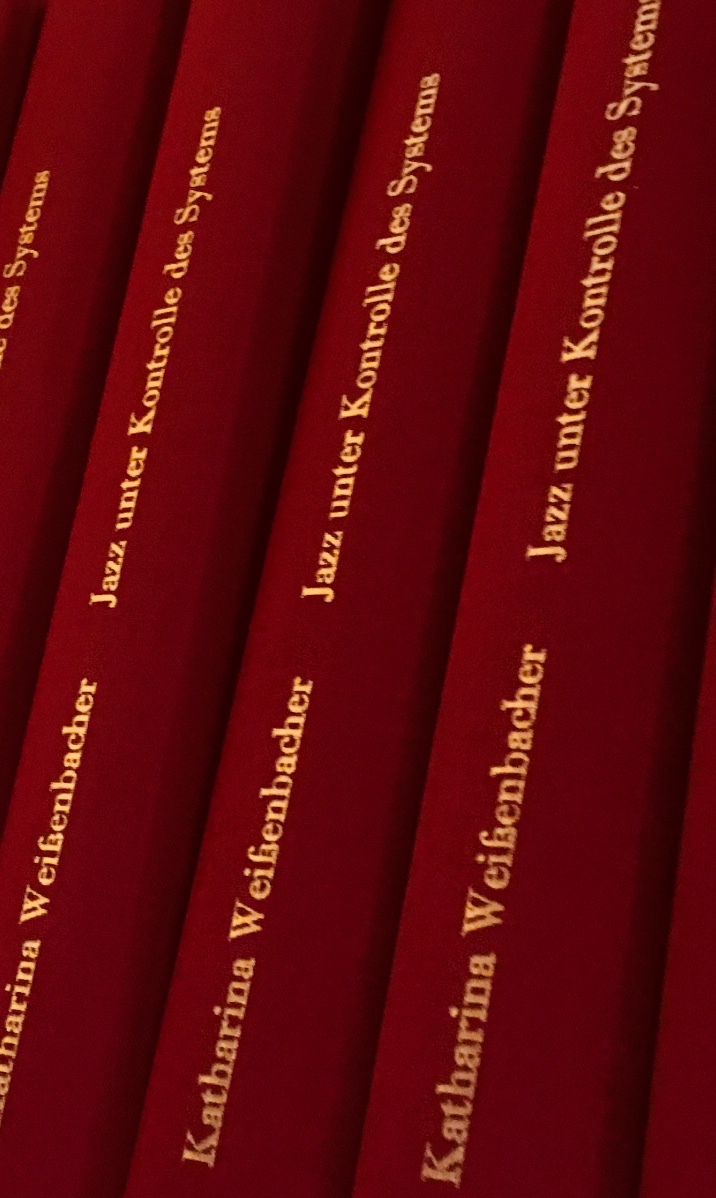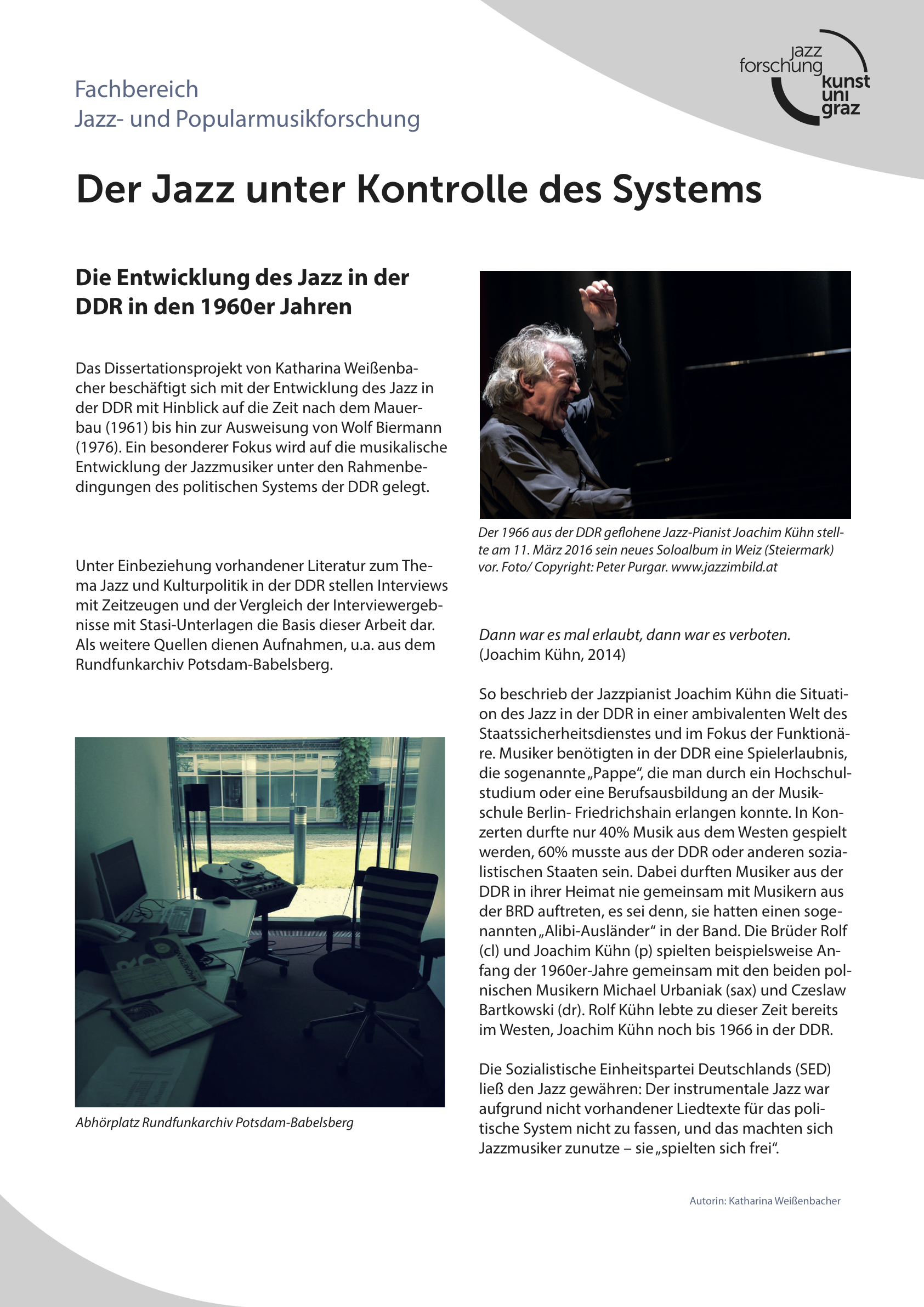Der Jazz unter Kontrolle des Systems
Die Entwicklung des Jazz in der DDR in den 1960er Jahren
Das Doktoratsprojekt beinhaltet folgende Thematik: Die Entwicklung des Jazz in der DDR mit Hinblick auf die Zeit nach dem Mauerbau. Ein besonderer Fokus liegt auf der musikalischen Entwicklung der Jazzmusiker unter den Rahmenbedingungen des politischen Systems der DDR. Im Laufe ihrer Arbeit führte Katharina Weißenbacher Interviews mit repräsentativen Jazzmusikern aus der DDR, nahm Einsicht in die Stasi-Akten zum Thema "Jazz in der DDR", recherchierte zu diesem Thema und zur Kulturpolitik under der Verwendung der bereits vorhandenen Literatur und beschäftigte sich mit Aufnahmen, u.a. aus dem Rundfunkarchiv Potsdam-Babelsberg.
Dann war es mal erlaubt, dann war es verboten. So beschrieb der Jazzpianist Joachim Kühn die Situation des Jazz in der DDR in einer ambivalenten Welt des Staatssicherheitsdienstes und im Fokus der Funktionäre. Musiker benötigten in der DDR eine Spielerlaubnis, die sogenannte "Pappe", die man durch ein Hochschulstudium oder eine Berufsausbildung an der Musikschule Berlin- Friedrichshain erlangen konnte. In Konzerten durfte nur 40% Musik aus dem Westen gespielt werden, 60% musste aus der DDR oder anderen sozialistischen Staaten sein. Dabei durften Musiker aus der DDR nie gemeinsam mit Musikern aus der BRD auftreten, es sei denn, sie hatten einen sogenannten "Alibi-Ausländer" in der Band. Da der instrumentale Jazz textlos war und ihn das System daher ideologisch nicht klar einordnen konnte, ließ die Sozialistische Einheitspartei (SED) die Jazzszene gewähren; das machten sie die Jazzmusiker zunutze &emdash; sie "spielten sich frei".
Jazz under suspicion of the political regime
The development of jazz in the GDR in the 1960s
The research project is concerned with the development of jazz in the GDR especially during the time after the construction of the Berlin Wall. It is focusing on the musical development of jazz musicians in the GDR under the conditions of the political regime. In her work, Katharina Weißenbacher led interviews with representative jazz musicians from the former GDR and did research on existing literature on her dissertation topic and on cultural policy in the GDR. She compared these sources with Stasi papers and also worked with the recordings from the Deutsches Rundfunkarchiv (DRA) in Potsdam-Babelsberg.
At times it was allowed, then it was forbidden again. This is how the jazz pianist Joachim Kühn described the situation of jazz in the GDR in the ambivalent world of the State Security Service (Stasi) and in the focus of the officials. In the GDR, musicians needed a permission to perform, the so-called "Pappe" (cardboard) which they could obtain via studies at one of the Music Academies or via vocational training at the music school Berlin-Friedrichshain. At concerts 60% of the music performed had to be from the East or other socialist countries, only 40% of the music was permitted from Western countries. In East Germany, musicians from the GDR were never allowed to perform with musicians from the Federal Republic of Germany (FRG) though. This was only possible if an "alibi foreigner" was part of the band, which was an unofficial term for a musician from another country. Since instrumental jazz music is not accompanied by lyrics, it remained unassailable to the political system; the jazz musicians took advantage of this fact &emdash; they "played themselves free".

Präsentationen an Tagungen und erste Publikationen
- 2013 Aktive Teilnahme am Nachwuchsworkshop des ASPM an der HfM Weimar
- 2013 Präsentation an der Tagung des ASPM "Typisch Deutsch - (Eigen)Sichten auf populäre Musik in diesem unseren Land" in Gießen
- 2014 Jazz-Tagung in Luzern "Growing Up - Jazz in Europa 1960 - 1980" (Publikation für die Europäische Zeitschrift für Musikwissenschaft in Arbeit)
- 2015 Tagungsbericht "Impulse für die Schweizer Jazzforschung" für die Schweizer Musikzeitung
- 2015 Tagungsbericht Jazz Research News Ausgabe 47 (2015)
- 2014 Präsentation an der Forschungstagung "Amerika-Euphorie - Amerika- Hysterie" am Zentrum für Populäre Kultur und Musik (ZPKM) der Albrecht- Ludwig-Universität Freiburg (eBook)
- 2015, 16. Juni: Gastvortrag an der Universität Köln "Jazz in der DDR in den 1960er-Jahren"
- 2015, 6./7. November: Präsentation bei musicaldiplomacy.org an der Technischen Universität Dortmund (Thema: "When Jazz was Crossing the Berlin Wall", Publikation eingereicht)
- 2016, 14. bis 17. April: Präsentation bei der "Jazz Utopia Conference" an der Birmingham City University (Thema: "Jazz and its others - jazz and the GDR state security service")
- 2016, 2./3. Juni: Präsentation bei der Popular Music in Eastern Europe Conference am IEAS, Department of British Studies University of Debrecen, Hungary (Thema: "The Swiss way of transporting American jazz to the GDR")
- 2016 Seit Oktober Mitglied des Vereins "Radio Jazz Research"
- 2017 31. August bis 3. September Präsentation bei der "Re/Sounding" Jazz Conference an der Universität Amsterdam (Thema: "Jazz behind the Iron Curtain - Free Jazz - A symbol of freedom in the GDR")
- 2017 26./27. Oktober Präsentation bei der Radio Jazz Research Tagung "Eisgekühlter Hot - Jazz in den Medien der 1950er Jahre" (Thema: "Die Anfänge des Jazz in der DDR")
- 2018 Verteidigung der Dissertation "Jazz unter Kontrolle des Systems - Die Entwicklung des Jazz in der DDR nach dem Mauerbau" (Bewertung: Sehr gut). Frühjahr 2020 Publikation in der Reihe "Jazz under State Socialism" beim Peter Lang Verlag (Flyer, Review)
- 2019, 11. bis 14. April Präsentation bei der Rythm Changes Conference "Jazz Journeys" in Graz
- 2019, Erscheinen der ersten Auflage von "Forschen, aber wie?" (Hep Verlag) Co-Autorin des Kapitels "Oral History"
